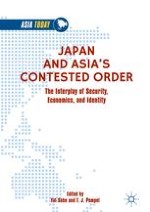2019 | OriginalPaper | Buchkapitel
4. To Dream an Impossible Dream: China’s Visions of Regional Order and the Implications for Japan
verfasst von : Xiaoyu Pu
Erschienen in: Japan and Asia’s Contested Order
Verlag: Springer Nature Singapore
Aktivieren Sie unsere intelligente Suche, um passende Fachinhalte oder Patente zu finden.
Wählen Sie Textabschnitte aus um mit Künstlicher Intelligenz passenden Patente zu finden. powered by
Markieren Sie Textabschnitte, um KI-gestützt weitere passende Inhalte zu finden. powered by
